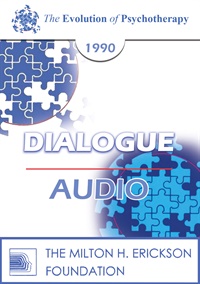
- Average Rating:
- Not yet rated
- Topic Areas:
- Dialogues | Goals of the Therapist | Psychotherapy | Therapist Development
- Categories:
- Evolution of Psychotherapy | Evolution of Psychotherapy 1990
- Faculty:
- Judd Marmor | Joseph Wolpe, M.D.
- Duration:
- 59 Minutes
- Format:
- Audio Only
- Original Program Date:
- Dec 14, 1990
- Short Description:
- Dialogue 05 from the Evolution of Psychotherapy 1990 - The Goals of Psychotherapy, featuring Judd Marmor, MD, PhD, and Thomas Szasz, MD. Moderated by Michael Yapko, PhD.
- Price:
- $15.00 - Base Price
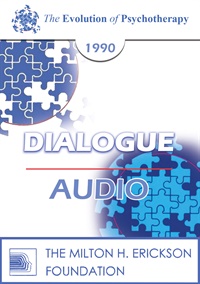
- Average Rating:
- Not yet rated
- Topic Areas:
- Dialogues | Social Issues | Psychotherapy
- Categories:
- Evolution of Psychotherapy | Evolution of Psychotherapy 1990
- Faculty:
- James Hillman, PhD | Thomas Szasz, MD
- Duration:
- 59 Minutes
- Format:
- Audio Only
- Original Program Date:
- Dec 14, 1990
- Short Description:
- Dialogue 06 from the Evolution of Psychotherapy 1990 - The Politics of Psychotherapy: Negative Effects and Intended Outcomes, featuring James Hillman, PhD, and Thomas Szasz, MD. Moderated by W Michael Munion, MA
- Price:
- $15.00 - Base Price
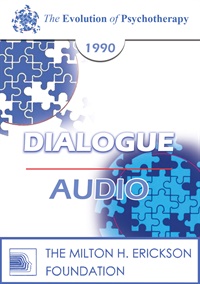
- Average Rating:
- Not yet rated
- Topic Areas:
- Dialogues | Psychotherapy | Research | Therapist Development
- Categories:
- Evolution of Psychotherapy | Evolution of Psychotherapy 1990
- Faculty:
- James Bugental, PhD | Mary Goulding, MSW
- Duration:
- 56 Minutes
- Format:
- Audio Only
- Original Program Date:
- Dec 14, 1990
- Short Description:
- Dialogue 07 from the Evolution of Psychotherapy 1990 - How Does Therapy Cure? featuring James FT Bugental, PhD, and Mary Goulding, MSW. Moderated by W Michael Munion, MA.
- Price:
- $15.00 - Base Price
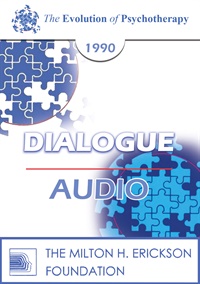
- Average Rating:
- Not yet rated
- Topic Areas:
- Dialogues | Personality Disorders | Psychotherapy | Therapist Development
- Categories:
- Evolution of Psychotherapy | Evolution of Psychotherapy 1990
- Faculty:
- James F. Masterson, MD | Donald Meichenbaum, PhD
- Duration:
- 58 Minutes
- Format:
- Audio Only
- Original Program Date:
- Dec 15, 1990
- Short Description:
- Dialogue 08 from the Evolution of Psychotherapy 1990 - Personality Disorders and Therapeutic Neutrality, featuring James Masterson, MD,and Donald Meichenbaum, PhD. Moderated by Joseph Barber, PhD.
- Price:
- $15.00 - Base Price
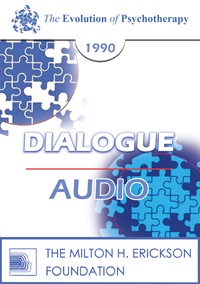
- Average Rating:
- Not yet rated
- Topic Areas:
- Dialogues | Psychotherapy | Therapist Development
- Categories:
- Evolution of Psychotherapy | Evolution of Psychotherapy 1990
- Faculty:
- Rollo May, PhD | Erving Polster, PhD
- Duration:
- 1 Hour 2 Minutes
- Format:
- Audio Only
- Original Program Date:
- Dec 15, 1990
- Short Description:
- Dialogue 09 from the Evolution of Psychotherapy - Growth Facilitation, featuring Rollo May, PhD, and Erving Polster, PhD. Moderated by Betty Alice Erickson-Elliott.
- Price:
- $15.00 - Base Price
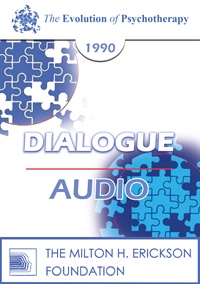
- Average Rating:
- Not yet rated
- Topic Areas:
- Dialogues | Ericksonian Hypnosis and Therapy Techniques | Milton Erickson | Psychotherapy
- Categories:
- Evolution of Psychotherapy | Evolution of Psychotherapy 1990
- Faculty:
- Jay Haley, MA | Ernest Rossi, PhD | Jeffrey Zeig, PhD
- Duration:
- 1 Hour 2 Minutes
- Format:
- Audio Only
- Original Program Date:
- Dec 15, 1990
- Short Description:
- Dialgoue 10 from the Evolution of Psychotherapy 1990 - Trialogue: The Contributions of Milton H Erickson, featuring Jay Haley, MA, Ernest Rossi, PhD, and Jeffrey Zeig, PhD. Moderated by Camillo Loriedo, MD.
- Price:
- $15.00 - Base Price
- Average Rating:
- Not yet rated
- Topic Areas:
- Dialogues | Family Therapy | Psychotherapy
- Categories:
- Evolution of Psychotherapy | Evolution of Psychotherapy 1990
- Faculty:
- Salvador Minuchin, MD | Carl Whitaker, MD
- Course Levels:
- Master Degree or Higher in Health-Related Field
- Duration:
- 58:44
- Format:
- Audio and Video
- Original Program Date:
- Dec 15, 1990
- Short Description:
- Dialogue 11 from the Evolution of Psychotherapy 1990 - Family Therapy: Terminable or Interminable? featuring Salvador Minuchin, MD, and Carl Whitaker, MD. Moderated by Stephen Gilligan, PhD.
- Price:
-
Sale is $29.00
price reduced from Base Price - $59.00
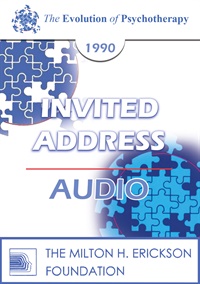
- Average Rating:
- Not yet rated
- Topic Areas:
- Invited Addresses | Buddhism | Meditation, Spirituality and Yoga | Ericksonian Hypnosis and Therapy Techniques | Psychotherapy | Strategic Therapy | Art and Creativity
- Categories:
- Evolution of Psychotherapy | Evolution of Psychotherapy 1990
- Faculty:
- Jay Haley, MA | William Glasser, MD
- Duration:
- 1 Hour 16 Minutes
- Format:
- Audio Only
- Original Program Date:
- Dec 12, 1990
- Short Description:
- A presentation of the influence upon therapy, particularly Strategic Therapy of Zen Buddhism. Similarities between therapeutic change and spiritual enlightenment are discussed in terms of the relationship between Master and trainee and therapist and client. The use of directives, of riddles, of absurd tasks, and the types of single interventions and paradoxical procedures are discussed. Examples of cases and Zen stories are compared. Zen, systems theory, and Erickson's strategic therapy are brought together.
- Price:
- $15.00 - Base Price
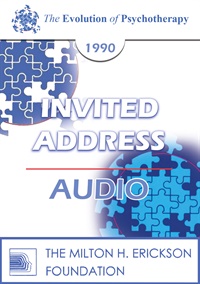
- Average Rating:
- Not yet rated
- Topic Areas:
- Invited Addresses | Psychotherapy | Storytelling | Metaphors
- Categories:
- Evolution of Psychotherapy | Evolution of Psychotherapy 1990
- Faculty:
- Cloe Madanes, HDL, LIC | Mary Goulding, MSW
- Duration:
- 1:35:43
- Format:
- Audio Only
- Original Program Date:
- Dec 12, 1990
- Short Description:
- Some new and some very old concepts will be discussed and illustrated with stories of psychotherapy cases.
- Price:
- $15.00 - Base Price
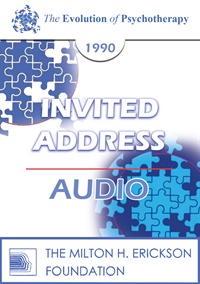
- Average Rating:
- Not yet rated
- Topic Areas:
- Invited Addresses | Social Issues | Family Therapy | History of Psychotherapy | Psychotherapy
- Categories:
- Evolution of Psychotherapy | Evolution of Psychotherapy 1990
- Faculty:
- Salvador Minuchin, MD | Mara Selvini Palazzoli, MD
- Duration:
- 1 Hour 26 Minutes
- Format:
- Audio Only
- Original Program Date:
- Dec 13, 1990
- Short Description:
- The theoretical concepts of family therapy have evolved since their beginnings in the 1950s. If we look at the political landscape of the '50s, '60s, '70s, and '80s, we see that family therapy parallels the political ethos of the time.
- Price:
- $15.00 - Base Price
Please wait ...


